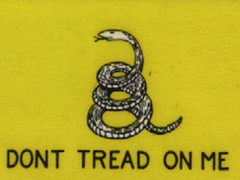 Via Angry Bear, and in, of all places, the Wall Street Journal Op-Ed page, I discover that newly-elected Virginia senator Jim Webb has been nurturing the sentiments of a Eugene Debs:
Via Angry Bear, and in, of all places, the Wall Street Journal Op-Ed page, I discover that newly-elected Virginia senator Jim Webb has been nurturing the sentiments of a Eugene Debs:The most important--and unfortunately the least debated--issue in politics today is our society's steady drift toward a class-based system, the likes of which we have not seen since the 19th century...He's raising the issues of racisim and discrimination here, at a time when government has been turning its back on the idea of affirmative action and even the idea that one social group remains at the bottom of the economic ladder because of, and solely because of, skin color and the historical baggage that color carries. Nowhere in our national dialogue on class have we been blinder, than to the obvious evidence that whites have been trying to escape blacks since the Southern Strategy, and that the resulting segregation has created an intractable economic and educational chasm between the races that continues to shame us all. And our history on this is so bowdlerized that we don't even know how advantage for whites at the expense of blacks was built into our most beloved entitlements from their inception in the 30's, 40's, and 50's. It takes a lot of courage for Webb to raise this issue in the current climate of Social Darwinism. But he knows that, to gain popular support, he must appeal to everone's bottom line ("this will hurt you, too!") before positioning it:
This ever-widening divide is too often ignored or downplayed by its beneficiaries. A sense of entitlement has set in among elites, bordering on hubris. When I raised this issue with corporate leaders during the recent political campaign, I was met repeatedly with denials, and, from some, an overt lack of concern for those who are falling behind. A troubling arrogance is in the air among the nation's most fortunate. Some shrug off large-scale economic and social dislocations as the inevitable byproducts of the "rough road of capitalism." Others claim that it's the fault of the worker or the public education system, that the average American is simply not up to the international challenge, that our education system fails us, or that our workers have become spoiled by old notions of corporate paternalism.
Still others have gone so far as to argue that these divisions are the natural results of a competitive society. Furthermore, an unspoken insinuation seems to be inundating our national debate: Certain immigrant groups have the "right genetics" and thus are natural entrants to the "overclass," while others, as well as those who come from stock that has been here for 200 years and have not made it to the top, simply don't possess the necessary attributes...
But the true challenge is for everyone to understand that the current economic divisions in society are harmful to our future. It should be the first order of business for the new Congress to begin addressing these divisions, and to work to bring true fairness back to economic life...And now for the real coup de gras (bolding mine):
More troubling is this: If it remains unchecked, this bifurcation of opportunities and advantages along class lines has the potential to bring a period of political unrest.He's talking about the ouster of political leaders, of course, but I think lurking in this statement is more: the possibility of real violence--mobs, riots, and tmass disregard for laws no longer seen as relevant. Most important and most amazing (for a machine political winner), Webb places this issue at the top of the American Hierarchy of Needs:
With this new Congress, and heading into an important presidential election in 2008, American workers have a chance to be heard in ways that have eluded them for more than a decade. Nothing is more important for the health of our society than to grant them the validity of their concerns. And our government leaders have no greater duty than to confront the growing unfairness in this age of globalization.Like the shrewd union organizers of old, Webb knows that you can't overcome class barriers unless you overcome the divisive policies of an economic elite, and help people understand that their common interests as workers and human beings are more important than where they come from and the colors of their skin.
As Eugene Debs once said:
We are not going to destroy private property. We are going to establish private property -- all the private property necessary to house man, keep him in comfort, and satisfy his wants. Eighty percent of the people of the United States have no property. A few have got it all. They have dispossessed the people, and when we get into power, we will dispossess them. We will reduce the workday and give every man a chance. We will go to the parks, and we will have music, because we will have time to play music and desire to hear it.Now.





No comments:
Post a Comment